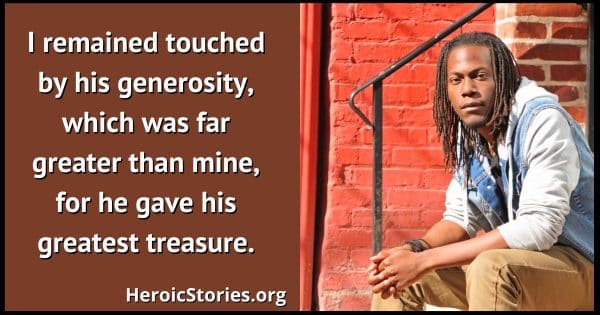by Mandy Bodart
South Africa

Some years ago, I lived in a Victorian street-front house in Cape Town, South Africa. These terraced houses have a small, paved front area, about a metre wide and four metres long, between the front door and the street. Where I lived, the street was a major walkway for vagrants on their way to shelter under a nearby fly-over.
Barely a day went by but someone knocked on the door asking for food. One very cold winter, the knocks became so frequent that I kept a stack of “vagrant bags” next to the front door. Each contained the fixings for a thick soup/stew and was clearly labelled “2” or “4”, according to how many people could have a decent meal from each bag.
The system worked like clockwork until one evening when I opened the door to an atypical vagrant — a young Rastafarian who didn’t have the weathered face and calloused hands of someone who’s been on the streets for years. He apologized for disturbing me and seemed embarrassed to ask for food — also very unusual!
As I automatically reached for a “2” bag, it occurred to me to ask him if he had cooking facilities. Our regular vagrants are as organized as cross-arctic explorers, but he just looked so young and inexperienced. “No,” he replied.
Luckily, I remembered that Rastas are vegetarian, and having made a big pot of veggie curry, I gave him some with directions to where the homeless people camped.
The next evening he was back. And the next, and the next…. This went on for three weeks.
As “You-can-call-me-Bob” had a hearty appetite, I began to fear I wouldn’t be able to continue feeding him daily, and decided to suggest that he vary his choice of “restaurant”.
That evening, he appeared at his usual time, but before I could say anything, he thanked me for my hospitality over the last few weeks, explaining that he had been stranded in Cape Town and now had a bus ticket back to his family in Port Elizabeth. He would leave in an hour.
At the end of this (for him) lengthy speech, he said he wanted to give me the only possession he had of any value. He pushed a large bag of dagga (marijuana) into my hand and ran off before I could say anything.
I didn’t know whether to laugh or cry. There I was, holding a large quantity of illegal drugs in my hand, knowing I couldn’t burn it because the neighbours would call the cops. I didn’t dare put it in the garbage in case it was traced back to me, and at the same time, I was so touched that ‘Bob’ had given me his most prized possession!
In case you’re wondering, I eventually mixed it with sand and dumped it in a municipal bin under cover of darkness. And yes, I remained touched by his generosity, which was far greater than mine, for he gave his greatest treasure.
Podcast: Play in new window | Download (Duration: 4:35 — 3.5MB)


Throughout history those with the least seem to be more aware of what generosity means. Giving away his most prized possession showed that he understood your sacrifice and caring. Your kindness is appreciated. I’m sure you have continued your generous ways. “We can’t help everyone, but everyone can help someone.” – Ronald Reagan
It seems that particular type of largesse used to be more common back in the day. While sitting with my seized motorcycle just south of Baltimore at 3 AM a “hippie” van pulled up with folks that would have liked to help. They had no tools, no trailer and no room. After a few minutes of discussion they started to pull away, stopped, then tossed me a “recreational” cigarette. They really did want to help and that was how they showed it.
Note to people outside Southern Africa: “dagga” is the word for “marijuana” down there!
I laughed – and cried. What a marvelous story. Thanks so much!